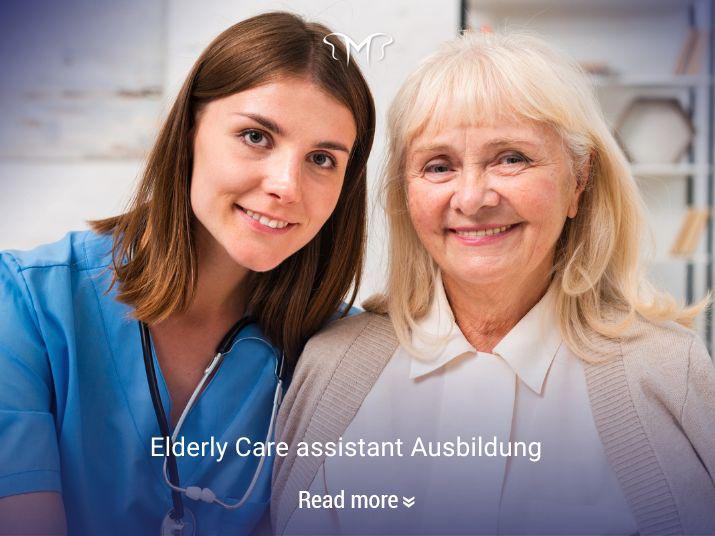
Geriatric Care Assistant Ausbildung in Germany and its admission requirements
Join the rewarding field of elderly care in Germany with the Elderly Care Assistant Ausbildung. erly Care Assistant Ausbildung in Germany – Start Your Career in Senior CareIf you are a nurse who is planning to immigrate to Germany with a nursing assistant degree, the elderly care assistant Ausbildung courses are one of the most ideal options that you can use to measure your chances. Germany is facing a severe shortage of nurses in the field of geriatric care due to the critical situation of the aging population. For this reason, the German government has designed courses under the title of Ausbildung geriatric care assistant to meet its need for geriatric care nurses.
Due to the high demand for participating in these courses, we decided in this article from the website of the Monarch Immigration Institute to fully review the elderly care assistant Ausbildung in Germany and its admission requirements, the educational topics of these courses, the amount of salary, working hours, etc. . If you are interested in this topic, stay with us until the end of the article.
Introduction to Elderly Care Assistant Training (Ausbildung) in Germany
Elderly individuals, regardless of their social or national background, require care and attention due to aging-related physical and mental vulnerabilities. The services offered to support them typically include monitoring blood pressure and sugar levels, ensuring proper medication use, assisting with daily activities, and more. According to the latest statistics and forecasts regarding Germany's population, the country is facing an aging population, indicating a growing demand for skilled professionals in elderly care. To address this need, vocational schools in Germany, in collaboration with hospitals and healthcare centers, have established Ausbildung programs for elderly care assistants, offering uniform and comprehensive curricula. Participants in these programs acquire theoretical knowledge and practical skills, enhancing their expertise and opening the door to promising career opportunities in Germany. If you are considering a career as an elderly care assistant, patience and a passion for helping seniors are essential qualities.

Curriculum of Elderly Care Assistant Training
The Ausbildung program for elderly care assistants in Germany combines theoretical and practical education. This program, which typically lasts 1 to 2 years, covers a range of topics such as:
-
Proper medication administration
-
Assisting with patient feeding
-
Monitoring patient diets
-
Controlling blood pressure and sugar levels
-
Dressing wounds, and more
One advantage of nursing education programs in Germany is the integration of theoretical lessons with practical internships in healthcare centers or hospitals. Graduates of this program can work in care facilities or as private caregivers for elderly individuals in their homes.
Essential Skills for Elderly Care Assistants
Caring for elderly patients demands a unique set of skills, categorized as follows:
Caregiving Skills
-
Managing the patient's diet according to their physical and mental condition
-
Regulating rest and sleep schedules
-
Handling personal hygiene and other daily needs
-
Ensuring timely medication use
-
Monitoring the patient's overall health
-
Caring for skin and hair
Communication Skills
Effective communication is crucial for longevity in this profession. Elderly individuals often need companionship and conversation. Key communication skills include:
-
Engaging in meaningful verbal interaction
-
Speaking clearly and understandably
-
Demonstrating patience and empathy
-
Acting as a supportive confidant
-
Managing sensitive or negative news delicately
-
Treating seniors with respect
Time Management Skills
This skill is especially important for assistants working in private homes. Efficiently organizing time ensures all tasks are completed during the workday, providing thorough care to the patient.
Problem-Solving Skills
Elderly care can be challenging and demanding. Interacting with seniors and addressing their personal needs can lead to occasional difficulties. Assistants, particularly in their initial months, may face numerous challenges. They must effectively manage these issues to prevent stress and maintain a calm environment, as tension negatively impacts both the caregiver and the elderly individual.

Salary During and After Training
Participants in the Ausbildung program for elderly care assistants in Germany do not receive a salary during the training period. Therefore, financial stability is a prerequisite for living in Germany. Living costs vary by city or state but average between €850 and €1,000 monthly for a single individual.
After completing the training, your income depends on your workplace—hospitals, nursing homes, or clinics. Entry-level salaries range from €1,500 to €2,000 per month, providing a decent quality of life in Germany. With experience, salaries typically increase. Statistics indicate that over 50% of elderly care workers in Germany earn between €2,000 and €3,000 monthly. Thus, pay varies significantly based on experience and work environment.

Working Hours for Elderly Care Assistants in Germany
According to German labor laws, healthcare professionals, including elderly care workers, typically work 35–40 hours per week. Shifts may occasionally include weekends or holidays. Work hours are agreed upon by the caregiver, the senior's family, or the care facility at the start of employment. Employers or families cannot demand overtime without the caregiver's consent.
This career path not only offers job security in a growing field but also the opportunity to make a meaningful impact on the lives of elderly individuals.
Job Opportunities After Completing Elderly Care Assistant Training (Ausbildung)
With Germany's aging population, job opportunities in elderly care are expanding steadily. Upon completing the Ausbildung program as an elderly care assistant, you have a 12-month period to stay in Germany and find suitable employment. This period can be extended for another 6 months if needed. Earning the Ausbildung certification opens up diverse job opportunities beyond specific roles. Here are some prominent career paths for graduates of this program:
1. Elderly Care in Hospitals
Hospitals are among the largest employers in the nursing sector. With a valid elderly care certification, you can work in departments dedicated to elderly care within various hospitals.
2. Elderly Care in Nursing Homes
With the increasing elderly population, the demand for elderly care workers in nursing homes is rising. You can work in public, nonprofit, or private nursing homes with the necessary skills acquired during training.
3. Private Elderly Care at Home
Another option is to work as a private caregiver in elderly individuals’ homes. Many families prefer in-home care for their elderly loved ones, creating opportunities for private caregiving roles.

Eligibility Criteria for Elderly Care Assistant Training (Ausbildung)
To enroll in an Ausbildung program for elderly care assistants in Germany, you need to meet specific criteria:
1. Educational Qualification
Applicants must have at least a high school diploma (12 years of education).
2. Language Proficiency
Since most Ausbildung programs are conducted in German, proficiency at a B2 level is required.
3. Physical and Mental Fitness
Candidates must be physically and mentally fit to handle the challenges of working with elderly individuals.
4. Age Limit
Although the typical age range is 16–27 years, Germany accepts applicants up to 40 years due to the nursing shortage.
5. Clean Criminal Record
Applicants must have no criminal record, ensuring they are trustworthy and safe to work in caregiving roles.
6. Financial Stability
Financial proof is essential for participation, as it is for most migration processes in Germany.
How to Apply for Elderly Care Assistant Training (Ausbildung)?
Both public and private vocational schools in Germany offer Ausbildung programs for elderly care assistants. To apply:
-
Online Application: Use the online system designed by the German government.
-
Documentation: Upload your personal details, educational records, resume, and motivation letter in PDF format.
-
Language Proof: Include proof of B2 German language proficiency.
-
Highlight Experience: Mention any relevant experience in elderly care or completed online courses to enhance your application.
Final Thoughts
If you are passionate about elderly care, joining an Ausbildung program as an elderly care assistant is an excellent pathway to migrate to Germany and establish a career in this field. This article has outlined the program details, eligibility criteria, and application process. For additional support or migration guidance, you can consult professionals at Monarch Immigration Institute, who provide comprehensive assistance free of charge.
FAQs
1. What are the entry requirements for the elderly care assistant Ausbildung program in Germany?
-
Educational qualifications, age limit, financial stability, and a clean criminal record.
2. What job opportunities are available for elderly care assistants in Germany?
-
Roles in hospitals, nursing homes, and private homes.
3. What skills are essential for elderly care assistants?
-
Caregiving, communication, problem-solving, and time management skills.


